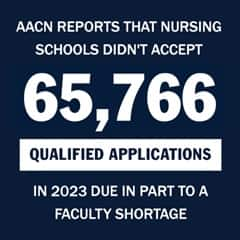What are the Top Majors in the Medical Field?

Know before you read
At SNHU, we want to make sure you have the information you need to make decisions about your education and your future—no matter where you choose to go to school. That's why our informational articles may reference careers for which we do not offer academic programs, along with salary data for those careers. Cited projections do not guarantee actual salary or job growth.
Have you ever thought about working in the medical field? There are lots of options out there for you to consider. Once you figure out which path is for you and the education you may need, you can begin working toward a rewarding career helping people.
A good starting place may be looking at majors in the medical field and the various types of healthcare degrees and concentrations available to you. Then, you can begin to look at what careers may be an option based on your desired education level and major. Once you figure out which path is for you and the education you may need, you can begin working toward those roles in your chosen area of focus.
What Are Some Types of Healthcare Degrees?
If you're interested in working in the healthcare industry, there are a variety of educational paths for you to consider.
Whether you're looking to get your bachelor's degree or you want to continue your education through a graduate program, there are tons of opportunities for you. And if you wish to add some extra credentials to your resume, certificates are also available.
Types of Bachelor's Degrees
You have several bachelor's degree options available to you. Some degrees focus more exclusively on healthcare, while others offer a blend of topics such as technology and healthcare, or business and healthcare, for example.
Community Health Education
A bachelor's in community health education can allow you to gain the skills necessary to assist with community wellness. This type of degree can help you make an impact in communities that need it most.
Potential careers for this program of study include health education specialist and community health worker.
Health education specialists earned $62,860 median pay in 2023, according to the U.S. Bureau of Labor Statistics (BLS), and BLS also expects the field to grow 7% between 2023 and 2033.*
For community health workers, the median pay was $48,200, according to BLS, with a growth projection of 13% between 2023 to 2033.*
Health Information Management (HIM)
A bachelor's in health information management should teach you about the professional skills required for an HIM career, such as the technology and terminology that may be used.
Programs accredited by the Commission on Accreditation for Health Informatics and Information Management Education (CAHIIM), such as the BS in Health Information Management and MS in Health Information Management programs at Southern New Hampshire University (SNHU), are designed with real-world standards in mind. Upon graduation from a CAHIIM-accredited program, you also meet one of AHIMA's eligibility requirements to sit for the Registered Health Information Administrator (RHIA) exam.
HIM specialists, such as medical records specialists, are responsible for organizing and managing health information data for patients, according to BLS. Medical records specialists earned $48,780 median pay in 2023, with a 9% growth in the field between 2023 and 2033, according to BLS.*
Health information technologists and medical registrars are two other types of HIM specialists. In 2023, they earned a median pay of $62,990, BLS reports, with the need for these positions expected to increase by 16% between 2023 and 2033.*
Health Sciences
A bachelor's in health sciences can support a career in one of the many types of allied health professions, whether you're just starting out or you're thinking about what's next. The program is designed to help you build foundations in sciences such as biology and anatomy and physiology, as well as the more logistical elements, including delivery of healthcare and reimbursement systems.
With a health sciences background, you could work in settings such as a lab, dental practice or outpatient facility to assist in the different aspects of patient care. In addition to patient-facing positions, you might pursue roles managing clinical settings, staff and programs.
Medical and health services managers earned a median salary of $110,680 in 2023, according to BLS, and the profession is projected to grow 29% through 2033.*
Healthcare Administration
A bachelor's in healthcare administration is similar to business administration. The main difference between this degree and business administration is this program focuses more on becoming a leader who can help make decisions to improve patient care.

Philip Hensarling '24 said he regularly uses what he learned in his healthcare administration program to navigate the challenges of managing a substance abuse center.
Hensarling, who earned his degree online at SNHU while living in Vermont, found his organizational behavior class to be especially translatable to his full-time work. "I was able to apply things that I was learning in school in real-time and talk about them weekly on discussion posts," he said.
Concentrations in health information management may be available within a healthcare administration program for those interested. Yet another possible concentration is patient safety and quality if you're interested in quality improvement in healthcare.
Nursing
A bachelor's in nursing (BSN) is a degree program that can help you develop your nursing career by teaching you skills such as safe nursing practices and preparing you for lifelong learning in the field, among other things. You'll focus on essential skills and competencies that go into patient care.
Some BSN programs, like the one at SNHU, are meant for registered nurses who are ready to take their education to the next level — whether to meet employment requirements or achieve a personal goal.

After more than 15 years in nursing, Jamila Aithammousaid '24 earned her BSN online at SNHU with the desire to become a better leader and make her family proud.
"In my nursing degree, I feel like all the courses were beneficial," said Aithammousaid, who traveled to her commencement ceremony from Massachusetts.
She especially enjoyed courses with a community focus. "I love to work with my community," she said.
Registered nurses made up a little over 3.3 million jobs in 2023, according to BLS, and BLS also expects the field to grow by 6% from 2023 to 2033.*
Public Health
A bachelor's in public health can teach you skills needed to identify public health challenges and then develop solutions for those challenges.
There are many ways you can use a public health degree, such as pursuing a career as an epidemiologist or working in environmental health.
Sociology
A bachelor's in sociology can help you solve real-world problems using history, experimentation and observation. If community health interests you, there may be a concentration where you can learn skills to help improve the health of individuals and communities.
There are other bachelor's degrees that you could consider, such as biology, that can help prepare you to work in the medical field.
If medical school interests you, another route you could consider is pre-med. (SNHU does not currently offer medical degrees.) If you want to be pre-med and get into a medical school, then there are a ton of ways to prepare. You could research the courses you'll need to take, required exam scores, extracurriculars and letters of recommendation, according to the American Medical Association (AMA).
Find Your Program
Types of Master's Degrees
If you're interested in getting a master's degree, there's no shortage of healthcare graduate programs for you to consider.
Business Administration
A Master of Business Administration (MBA) program can teach you practical decision-making skills and help you develop strategies for business. With a concentration in healthcare management, you can use your business knowledge to learn how you can impact patient care and current healthcare trends with your MBA.

When Sherita Dawkins '24MBA became a director at a Fortune 500 company, she knew she needed to upskill. "It was really challenging, and my manager was asking me for more," she said.
So, she decided to earn an MBA in Healthcare Management online at SNHU from her home state of Tennessee. Now a graduate, Dawkins, who works with health insurance companies, said she's been able to develop the skills and knowledge she had sought out.
"Those things that my manager was talking about that I had no clue — I now know," she said. "And I feel better prepared to be able to face the future with the knowledge that I gained being here."
BLS expects about 1.2 million job openings per year from 2023 to 2033, across all management occupations.*
Health Information Management
A CAHIIM-accredited master's in health information management is the ideal next step from the bachelor's in HIM. Although, if you come from a different educational background or are looking to change careers, developing your skills in data systems and analysis with a master's in HIM can help open up new career paths for you.
This program can also prepare you for various leadership and management roles in the HIM industry.
Healthcare Administration
A master's in healthcare administration can increase your qualifications in various ways and help prepare you for a variety of new career options, such as leading a healthcare organization.
Take note: There is a difference between healthcare administration and management. Healthcare administrators are usually more involved with organizational management and have less to do with the business side of operations.
Information Technology (IT)
A master's in information technology can combine your interest in technology and helping people to assist the healthcare system. With a concentration in healthcare informatics, you can transform your IT master's degree into a tool that can help you pursue a broader range of positions in healthcare organizations, including management.
Computer and information system managers are expected to grow by 17% from 2023 to 2033, BLS projects.* BLS also reports they earned a median pay of $169,510 in 2023.*
Management
A master's in management can help you develop the skills needed to become a manager of people and projects. A concentration in healthcare can help add that particular focus to implementing healthcare quality improvement within the industry.
Medical health and service managers earned $110,680 median pay in 2023, BLS reports, and the field is expected to grow by 29% from 2023 to 2033.*
Nursing
A master's in nursing is another step in your nursing education following the completion of your BSN. There are several MSNs to choose from based on the type of work you'd like to be doing.
A few tracks are:
- Family Nurse Practitioner
- Healthcare Quality & Safety
- Nurse Executive Leadership
- Nursing Education
- Population Health
These nursing programs can lead to rewarding jobs in healthcare. For example, nurse practitioners are one of the top-growing healthcare jobs, with a 40% growth expected between 2023 and 2033, according to BLS.*
Another nursing career on the rise is nursing instructors and teachers, which is expected to grow 18% from 2023 to 2033, according to BLS.*
Public Health
A Master of Public Health (MPH) program can expand your knowledge of the healthcare industry through learning about complex public health issues and how to transform people's lives.
When looking at MPH programs, consider one that is accredited by the Council on Education for Public Health (CEPH), such as SNHU's. CEPH is an independent agency recognized by the U.S. Department of Education, and its accreditation means that the program has met the standards.
One concentration you may have available to you is global health. With a focus on global health, you can set your sights beyond helping your local communities and look to make an impact on a worldwide scale.

Earning an MPH degree was a way for Wanda Edwards '24MPH, who traveled from Florida to attend her SNHU commencement ceremony, to unite her two backgrounds. As a licensed practical nurse with 26 years of experience in IT project management system software design, Edwards wanted to pivot her career.
"I want to be able to put together ... all those transferable skills and move it over to the public health arena so that I can really, really help the community," she said.
Biostatistics was especially beneficial to Edwards, who learned how to draw meaning from numbers, and she has learned to "speak public health" — understanding the lingo and concepts involved.
Types of Certificates
You may also be interested in getting a certificate to help boost your resume or develop your skill set further. Certificates can be earned before your bachelor's degree or after your master's degree — or sometimes in between; it all depends on the certificate's requirements and your own goals.
An example would be a certificate in healthcare quality & safety, a post-master's program. This certificate is one that you could earn after your master's degree and help you further refine your skills in enhancing patient care.
Read more: Degrees vs. Certificate Programs: What's the Difference?
Which Medical Fields Are Most in Demand?
The healthcare field, in general, is on the rise. According to BLS, about 1.9 million healthcare job openings are expected annually from 2023 to 2033, which is much higher than the national average for all jobs.*
Here are 10 growing jobs in the healthcare field and a description of each role, according to BLS:
- 46% growth from 2023 to 2033, BLS reports*
- Deliver primary and specialty patient care
- Typically requires at least a master's degree from an accredited advanced practice nursing program and licensure as a registered nurse
- 28% growth from 2023 to 2033, BLS reports*
- Practice medicine with teams of physicians and surgeons
- Typically requires a master's degree from an accredited physician assistant education program (SNHU does not currently offer a physician assistant program.)
3. Physical Therapist Assistants
- 25% growth from 2023 to 2033, BLS reports*
- Help patients regain movement and manage pain under the supervision of physical therapists
- Typically requires an associate degree from an accredited program and licensure or certification (SNHU does not currently offer a physical therapy assistant program.)
4. Occupational Therapy Assistants
- 22% growth from 2023 to 2033, BLS reports*
- Help patients develop, recover and improve the skills needed for daily living
- Typically requires an associate degree from an accredited occupational therapy assistant program (SNHU does not currently offer an occupational therapy assistant program.)
5. Home Health and Personal Care Aides
- 21% growth from 2023 to 2033, BLS reports*
- Monitor the condition of patients with disabilities or illnesses
- Requires a high school diploma or equivalent
- 18% growth from 2023 to 2033, BLS reports*
- Treat clients by using touch to manipulate muscles and tissue
- Requires a postsecondary nondegree award, usually a certification or licensure (SNHU does not currently offer a massage therapy program.)
7. Speech-Language Pathologists
- 18% growth from 2023 to 2033, BLS reports*
- Assess, diagnose and treat to help prevent communication and swallowing disorders
- Typically requires a master's degree in speech-language pathology (SNHU does not currently offer speech-language pathology degrees.)
- 17% growth from 2023 to 2033, BLS reports*
- Monitor and care for patients experiencing mental or emotional conditions as well as developmental disabilities
- Typically requires a postsecondary certificate for psychiatric technicians, and some states require licensure (SNHU does not currently offer a psychiatric technician program.)
- 16% growth from 2023 to 2033, BLS reports*
- Assess individual or family risk for inherited conditions
- Typically requires a master's degree in genetic counseling and licensure (SNHU does not currently offer genetical counseling degrees.)
10. Health Information Technologists and Medical Registrars
- 16% growth from 2023 to 2033, BLS reports*
- Use electronic healthcare systems to organize, collect and analyze medical information
- Typically requires at least an associate degree in a program such as health information management (SNHU does not currently offer an associate degree in HIM.)
What Are the Highest Paying Medical Jobs?
While money may not be the reason you choose to pursue a career in healthcare, understanding the compensation for the top-paying jobs, broken out by required degree level, could be valuable.
Bachelor's Degree Level
Here are some of the top-paying jobs that typically require you to have a bachelor's degree and a description of each position, according to BLS:
(SNHU does not offer programs for the positions listed below, apart from BSN degrees for nurses.)
1. Medical Dosimetrists
- $132,880 median pay in 2023, BLS reports*
- Create radiation treatment plans for patients with cancer and other diseases
2. Registered Nurses
- $86,070 median pay in 2023, BLS reports*
- Provide and coordinate patient care and educate patients
3. Dietitians and Nutritionists
- $69,680 median pay in 2023, BLS reports*
- Plan and conduct food service or nutritional programs
4. Clinical Laboratory Technologists and Technicians
- $60,780 median pay in 2023, BLS reports*
- Collect samples and perform tests to analyze bodies
5. Recreational Therapists
- $57,120 median pay in 2023, BLS reports*
- Plan and coordinate treatment plans involving recreational activities that support patient well-being
Master's Degree Level
Here are the top five paying jobs that typically require you to have a master's degree and a description of each position, according to BLS:
(SNHU offers nurse practitioner degrees but does not currently offer programs for other positions listed below.)
1. Physician Assistants
- $130,020 median pay in 2023, BLS reports*
- Practice medicine on teams with physicians and surgeons
2. Nurse Anesthetists, Nurse Midwives and Nurse Practitioners
- $129,480 median pay in 2023, BLS reports*
- Coordinate patient care and may provide primary and specialty care
3. Occupational Therapists
- $96,370 median pay in 2023, BLS reports*
- Treat patients who have injuries, illnesses or disabilities through therapy
4. Genetic Counselors
- $95,770 median pay in 2023, BLS reports*
- Assess individual or family risk for inherited conditions
5. Speech-Language Pathologists
- $89,290 median pay in 2023, BLS reports*
- Assess, diagnose and treat to help to prevent communication and swallowing disorders
Doctoral Degree Level
Here are the top five paying jobs that typically require you to have a doctoral or professional degree and a description of each position, according to BLS:
(SNHU does not currently offer degree programs for the below positions.)
1. Physicians and Surgeons
- $239,200 median pay in 2023, BLS reports*
- Diagnose and treat injuries or illnesses and focus on patient wellness
2. Dentists
- $170,910 median pay in 2023, BLS reports*
- Diagnose and treat problems with the teeth, gums and mouth, provide wellness care and more
3. Podiatrists
- $141,650 median pay in 2023, BLS reports*
- Provides medical and surgical care for the lower leg, including ankle and foot
4. Pharmacists
- $136,030 median pay in 2023, BLS reports*
- Dispense prescription medications and advise customers
5. Optometrists
- $131,860 median pay in 2023, BLS reports*
- Diagnose and treat visual problems, manage issues with the eyes and provide wellness care
These are just some of the many jobs available within the healthcare industry. There are tons of paths that branch off these, such as the various types of nursing jobs available.

It may also help to stay on top of current trends within the industry, such as the nursing shortage. The nursing shortage is caused by several factors, including nurses retiring or leaving the profession and the aging population requiring a higher level of care.
Another reason is the shortage of nurse educators. Approximately 65,766 qualified nursing applications were not accepted in 2023 due in part to the lack of educators available to teach them, according to the American Association of Colleges of Nursing.
Health education is important whether you are pursuing a bachelor's or master's degree, or even a certificate, and there are countless careers that you can consider pursuing within the healthcare industry.
A degree can change your life. Find the SNHU health program that can best help you meet your goals.
*Cited job growth projections may not reflect local and/or short-term economic or job conditions and do not guarantee actual job growth. Actual salaries and/or earning potential may be the result of a combination of factors including, but not limited to: years of experience, industry of employment, geographic location, and worker skill.
Nicholas Patterson ’22 ’25MFA is a writer based in West Michigan with several years of experience as a content creator in higher education. He’s an alumnus of Southern New Hampshire University (SNHU), where he earned both his bachelor’s in English and creative writing and his Master of Fine Arts in Creative Writing. When his head’s not in novels, you can find him outside dreaming up his own stories. Connect with him on LinkedIn.
Explore more content like this article

Academic Spotlight: Dr. Shakera Moreland, Health Sciences Clinical Faculty Member

SNHU Hosts 5th Annual Global Summit for Healthcare Professionals

How to Become a Nurse in 4 Steps
About Southern New Hampshire University

SNHU is a nonprofit, accredited university with a mission to make high-quality education more accessible and affordable for everyone.
Founded in 1932, and online since 1995, we’ve helped countless students reach their goals with flexible, career-focused programs. Our 300-acre campus in Manchester, NH is home to over 3,000 students, and we serve over 135,000 students online. Visit our about SNHU page to learn more about our mission, accreditations, leadership team, national recognitions and awards.


